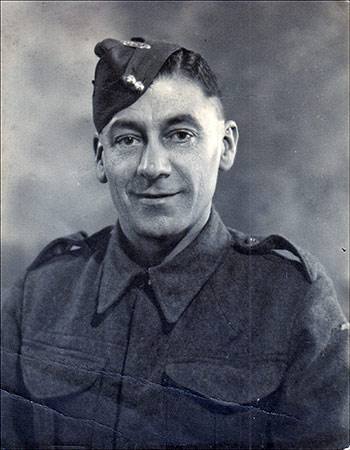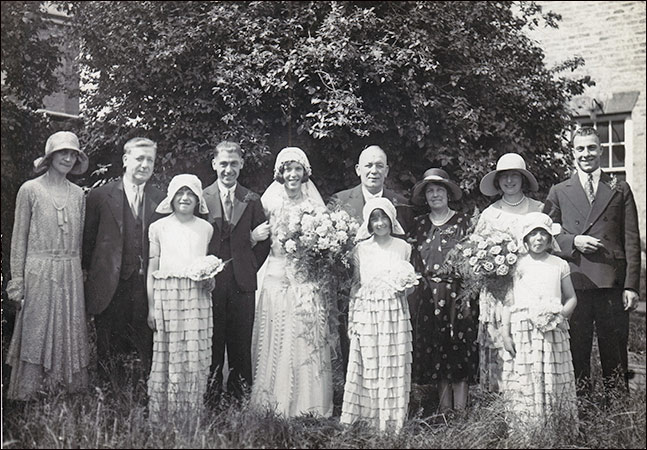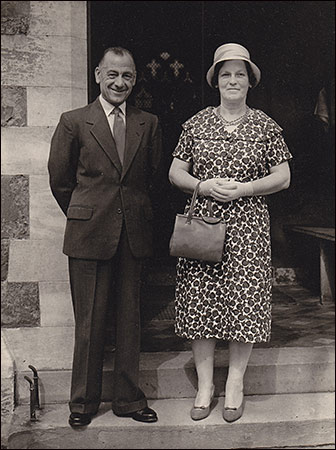Barrie Mackay 2014 |
||||
|
||||
|
||||
|
Receiving his education at the Church Endowed School in Burton Latimer, Frank, once he was of age, went to work as a clerk at the Thorneloe & Clarkson factory, which at that stage was managed by Jacob (“Jake”) Northern (1884–1939), married to another Newman aunt, Mary Jane (1882–1964). It was at the factory that Frank met Rhoda Ethel Miller (1908–2003), employed as a machinist, and they were married at the Parish Church on 6 June 1931. In the April of that year, whilst still living with the Chamberlains at 14 Cranford Road, Frank had bought the mid-terrace house at 16 Pioneer Avenue, enabling the couple to move into their new home straight after the wedding ceremony. Three daughters were to be brought into the world by Frank and Rhoda.
From an early age, much of Frank Toop’s spare time was taken up with the Parish Church, the Church Army and the Mission Room, as acknowledged in the eulogy that appeared in the Oct 1978 edition of Focus, extracts from which are quoted as follows: “By the death of Frank Toop on 13th August the Church lost the services of one of it's most devoted sons. Frank had throughout his life been a tireless worker for the Church he loved so well. He had been involved in the work of the Church in all it's aspects and he was never known to refuse any task required of him. He had been a member of the Church Council and it's Committees, he was always to the forefront in working for the annual bazaars, he had been a deputy warden and sidesman, a distributor for Focus, a faithful member of the CEMS Branch, and latterly had performed duties of verger at the occasional offices of the Church. A veritable tower of strength, a man of considerable talent, a modest man, a man of unfailing good humour — one cannot ever recall seeing Frank without his welcoming smile… The well attended funeral testified to the high esteem with which Frank was held throughout the Town... .” Keen on sport, Frank was particularly fond of cricket both as a player and a spectator, representing such local teams as the Church Army Cricket Club XI. A barometer bears the inscription: “Presented to Mr F. Toop by members of the C.A.C.C. for faithful service as Secretary 1926–35”. In Aug 1942, Frank was called-up to enlist in the Territorial Army, between October of that year and June 1946 serving as a Signalman in Royal Corps of Signals (as a wages clerk nimble with figures he was well equipped for this role). [His half-brother, Albert Alan Toop (1912–90), served as a Sapper in the Royal Engineers in North Africa.] Frank had two tours of duty abroad. As one of thirty-five Royal Signals “other ranks” posted to 9 Medium Regiment, Royal Artillery in Feb 1944, on 14 July 1944, in the wake of the June 6th D-Day landings, Frank disembarked in Normandy with 9 Med Regt RA. Grouped as necessary with other artillery formations, 9 Med Regt RA appears to have spent much, if not all, of the next ten months of the North-West Europe campaign acting in support of Gen. Crerar’s 1st Canadian Army, from Normandy to the Netherlands and beyond. [Whilst in the Netherlands, Frank established a close friendship with a Dutch family, with whom he kept in regular contact after the war.] Back in the UK in June 1945 and posted to a reserve division, Oct 1945 saw Frank bound for Burma to serve with Allied Land Forces South East Asia as one of those replacements for British servicemen who, under a pledge given by the incoming Attlee Labour Government, were first for demobilization, having spent at least four years abroad. In Burma in a post-war role Frank was attached to 1 Med Regt RA. His tour of duty with A.L.F.S.E.A. finishing in March 1946, on 25 June, after returning to the UK, Frank was finally granted Class “A” release. Click here to read the card Frank brought home, signed by many of his comrades-in-arms. Upon his return to civilian life, Frank initially joined his brother-in-law, Tom Miller junior, and their wives at the shop in Burton Latimer High Street selling wet fish, fish & chips and green groceries [click here for details of the shop]. Subsequently he was employed as a driver by Coles Boot Co. Ltd, where he remained until his retirement in 1969. The name “Toop” (with variants) is thought by some to be of 9th-century Danish extraction, its English origins quite possibly being Dorset. Frank would have been able to trace his paternal ancestry back to successive generations of 18th-century weavers living in Wiltshire. By the earlier part of the 19th century, a large concentration of Toops at Dilton Marsh near Westbury was engaged in handloom weaving, but that was not to last: encroaching mechanization of the industry forced many to take up new occupations and to migrate. It was probably economic necessity that prompted Frank’s grandfather, Walter Toop (1845–1927), to leave his native West Country to seek work in the Northamptonshire footwear industry, describing himself as a shoe riveter by the time he married Sarah Ann Tite (1848–1929), a boot closer, at Wellingborough in 1868. Walter, Sarah and their family were living at 17 Salem Lane, Wellingborough in 1880 when Frank’s father, Bernard Toop, was born. By 1903, Bernard had moved to Burton Latimer where his older brother, George Thomas Toop (1869–1950), and the latter’s wife, Minnie Toop (née Darnell, 1872–1928), were also to be found. |
||||


